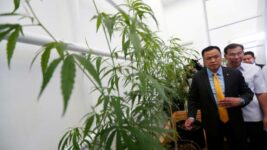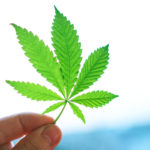Thailand Legalises Cannabis, Handing Out One Million Plants to Citizens

On Thursday, 9 June 2022, Thailand legalised both cannabis and hemp nationwide, with the ability for unlimited homegrow, as well as establishing both boutique and larger businesses specialising in cannabis products or the manufacturing of goods containing the substance.
The only major prohibition is on cannabis extracts that contain 0.2 percent or more tetrahydrocannabinol, or THC, which is the psychoactive component of the plant.
Cannabis must be consumed at home and not in public. And technically, recreational use still appears to be illegal.
Public health minister Anutin Charnvirakul facilitated the reforms via the removal of both cannabis and hemp from a category five listing in February this year, which, up until then, had seen the plant classified as a controlled narcotic drug.
“Cannabis actually has plenty of medical benefits, not different from other herbs, and we are trying our best to make the Thai people enjoy both medical and economic benefits from it,” Anutin, a member of the Bhumjai Thai Party, said at the time.
Part of the current Thai coalition government, Bhumjai Thai campaigned for the 2019 election on a platform that included cannabis legalisation to help farmers. The political party made these promises as the nation was moving to become the first in Asia to legalise medicinal cannabis last year.
Homegrown herbal medicine
In early May, the Thai health minister announced that the government would be handing out one million plants to households to accompany the nationwide reform, which he considers will bring in over 10 billion baht in tax revenue annually.
On being encouraged by the government to homegrow, households only have to register the number of plants grown on the new Plookganja app that was recently launched by the Thai Food and Drug Administration (FDA).
The 2020 legalisation of cannabis medicine only provided for the lawful use of oil. However, the herb’s delisting from the category of narcotic opens up the way for all parts of the plant, including flowers and seeds, to be consumed legally.
FDA deputy secretary general Withit Saritdeechaikul outlined in April that the agency had already received over 4,700 licence applications from individuals and companies seeking to produce or import cannabis products.
Cannabis offences wiped
Thailand is also releasing thousands of inmates detained on cannabis-related charges, The Bangkok Post reported on 4 June.
The Thai Office of the Judiciary announced last week that all ongoing trials and sentences will be cancelled as of Thursday this week.
Judiciary Office spokesperson Sorawit Limparangsri said that orders for prisoner releases will be dealt with on a case-by-case basis, although he noted that few cannabis cases have actually resulted in incarceration.
Citizens with criminal records relating to the dismissed charges will have the listings erased from criminal databases, while those awaiting rulings will have their case cancelled but they’ll still have to turn up to court to hear an official ruling.
The Thai Department of Corrections estimates that about 4,000 prisoners nationwide are set to be released under the changes.







